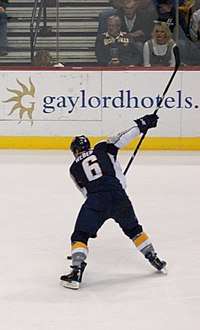Slapshot

A slapshot (also spelled as slap shot) in ice hockey is the hardest shot one can perform. It has four stages which are executed in one fluid motion to make the puck fly into the net:
- The player winds up his hockey stick to shoulder height or higher.
- Next the player violently "slaps" the ice slightly behind the puck and uses his weight to bend the stick, storing energy in it like a spring. This bending of the stick gives the slapshot its speed. Just like a bow and arrow, the stick's tendency to return to being straight is transferred to the puck, giving it much more speed than just hitting it alone could.
- When the face of the stick blade strikes the puck, the player rolls his wrists and shifts his weight so that the energy stored in the stick is released through the puck.
- Finally, the player follows through, ending up with the stick pointed towards the desired target.
The slapshot is harder than other shots and, because of the violent motion involved, somewhat less accurate. It also takes longer to execute; a player usually cannot take a slapshot while under any significant pressure from an opposing player because the opponent could easily interfere during the windup. The slapshot is most commonly used by a defenceman at the point, especially during a power play, although a forward will sometimes find an opportunity to use it.
The invention of the slapshot is credited to Bernard "Boom Boom" Geoffrion (a nickname alluding to the thunderous clack of his slapshots) of the Montreal Canadiens.[1] Black Canadian Eddie Martin, of the Coloured Hockey League's Halifax Eurekas, has also been credited with inventing the slapshot in the late 1800s.[2] Dick Irvin, who was a star player in the WCHL and PCHA – and who later coached Geoffrion with the Habs – was also renowned for having a hard and accurate slap shot. Growing up in Winnipeg in the 1890s and 1900s, he would practice shooting against a doorknob in his attic during the winter months for accuracy. In the summertime, Irvin would draw a chalk outline of a net onto his family's sled garage, and practice one-timers off a piece of wooden board embedded into the ground.[3]
During a hockey game, a puck can reach the speeds of 100 miles per hour (160 km/h) or more when struck. The current NHL speed record is held by Zdeno Chára of the Boston Bruins clocked 108.8 miles per hour (175.1 km/h)
</ref> Alexander Riazantsev of KHL's Spartak Moscow slapped a puck at the 2012 KHL All Star Game skills competition in Latvia with a speed of 114.127 mph (183.67 km/h); however, the NHL does not recognize this as breaking Chára's record, as the puck travels a shorter distance to the goal net in KHL competitions than in those of the NHL.[4][5]
See also
External links
- How to Take a Slapshot Recent article with pictures, and video
References
- ↑ "Bernie Geoffrion dead at 75". CBC News. March 11, 2006.
- ↑ Fosty, George; Fosty, Darril (2008). Black Ice: The Lost History of the Colored Hockey League of the Maritimes, 1895-1925. Nimbus Publishing. p. 114. Retrieved 2017-03-21.
- ↑ "Dick Irvin Was a Dedicated Player: Practiced Profusely, Loved Hockey". The Montreal Gazette. May 17, 1957.
- ↑ Wyshynski, Greg (2012-01-21). "KHL's Alexander Ryazantsev sets new 'world record' for hardest shot at 114 mph". Yahoo. Retrieved 2012-08-07.
- ↑ KHL All-Stars Hardest Shot Competition